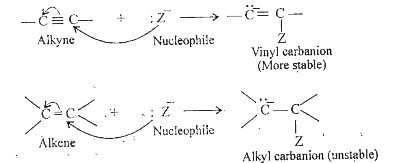Why alkynes undergo nucleophilic addition reaction while simple alkenes do not ?Solution in Punjabi
It can be explained on the basis of relative stability of the intermediate carbanions. These intermediate carbanions are formed by the nucleophilic attack on alkenes and alkynes.

The carbanion formed from alkynes is sp2 hybridised, so carbon atom has greater s-character. Greater s-character can accomodate more negative charge. Whereas alkyl carbanion is sp3 hybridised and can accomodate lesser negative charge. So, carbanions formed from alkynes are more stable than the carbanions of alkène. Hence, alkynes undergo nucleophilic addition reaction easily while alkenes do not give these reactions.
Topper's Solved these Questions
- BOOK - OMEGA PUBLICATIONCHAPTER - HYDROCARBONSEXERCISE - MULTIPLE CHOICE QUESTIONS (MCQs)24videos
HYDROCARBONS
- BOOK - OMEGA PUBLICATIONCHAPTER - EQUILIBRIUM EXERCISE - Multiple Choice Questions (MCQs)25videos
EQUILIBRIUM
- BOOK - OMEGA PUBLICATIONCHAPTER - HYDROGENEXERCISE - MULTIPLE CHOICE QUESTIONS28videos
HYDROGEN
Similar Questions
Both methane and ethane can be prepared in single step by the use of
04:22View SolutionList the value of n and l for the following orbitals : 4s
03:41View SolutionThe nuclei of tritium (1H3 ) atom would contain neutrons .
03:41View SolutionWhich of the statements are WRONG about the nucleophilic addition reaction of alkenes and alkynes?
01:09View SolutionWhy do alkenes prefer to undergo electrophilec addition reaction while arenes prefer electrophilic substitution reactions ? Explain.
01:45View SolutionWhy do alkenes prefer to undergo electrophilec addition reaction while arenes prefer electrophilic substitution reactions ? Explain.
02:19View SolutionAssertion. Alkynes are more reactive towards nucleophilic addition reaction as compared to alkenes Reason. Alkynes contain two pi bonds, while alkenes have only one pi bond
02:44View SolutionExplain why Aldehydes and ketones undergoes nucleophilic addition while alkenes undergoes electrophilic addition though both are unsaturated compounds.
01:52View SolutionAlkenes and alkynes are unsaturated hydrocarbons and undergo electrophilic addition reactions. In alkenes, the addition occurs in one step while in alkynes the addition occurs in two steps. Alkenes show geometrical isomerism but alkynes do not. Alkynes are more acidic than alkenes which are more acidic than alkanes. Both alkenes and alkynes can be prepared by the electrolysis of sodium or potassium salts of carboxylic acids. Write the major product of the reaction : (CH_(3))_(3)C-CH=CH_(2)overset(HBr)to
00:50View SolutionWhy do alkenes undergo electrophilic addition reactions ?
03:23View SolutionWhy do alkenes undergo electrophilic addition reactions ?
03:12View SolutionWhy do alkynes undergo addition reactions while simple alkenes do not?
01:01:14View SolutionWhy do alkenes prefer to undergo electrophilec addition reaction while arenes prefer electrophilic substitution reactions ? Explain.
06:39View SolutionWhy do aldehydes and ketones undergo nucleophilic addition reaction?
05:13View SolutionAddition and Epoxidation Reactions OF Alkenes and Alkynes
05:33View SolutionWhy do alkenes and alkynes undergo addition reactions ? Describe some important addition reactions of alkenes and alkynes.
02:59View Solution

